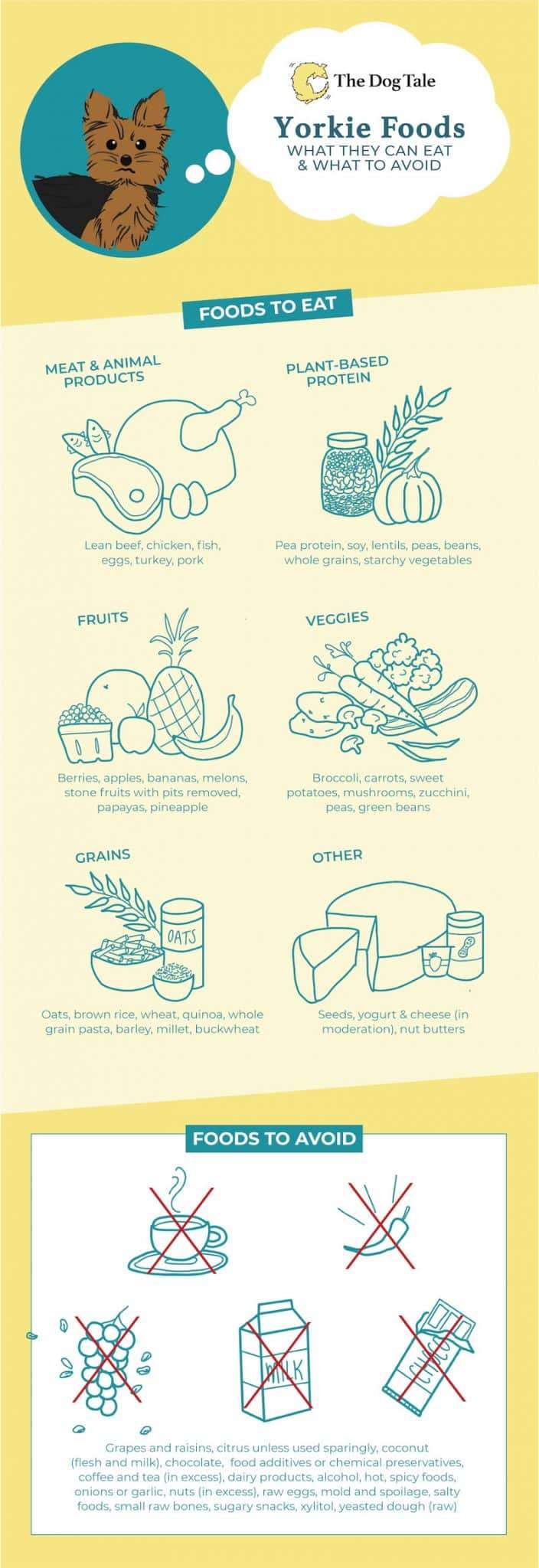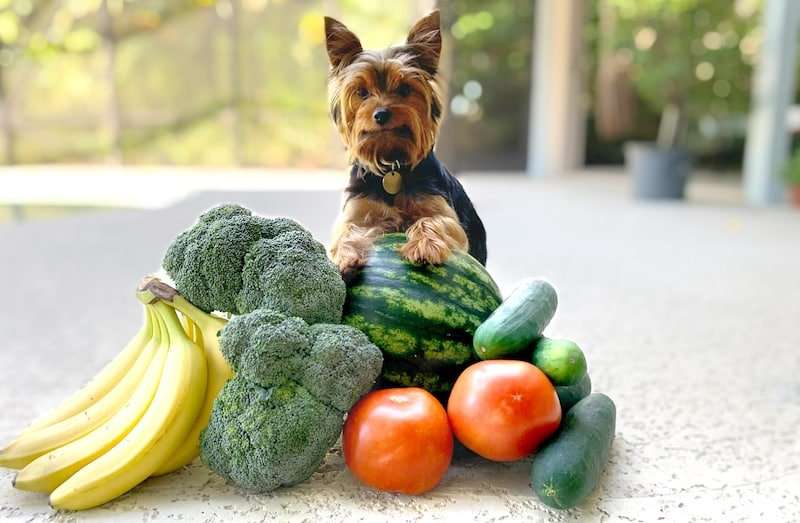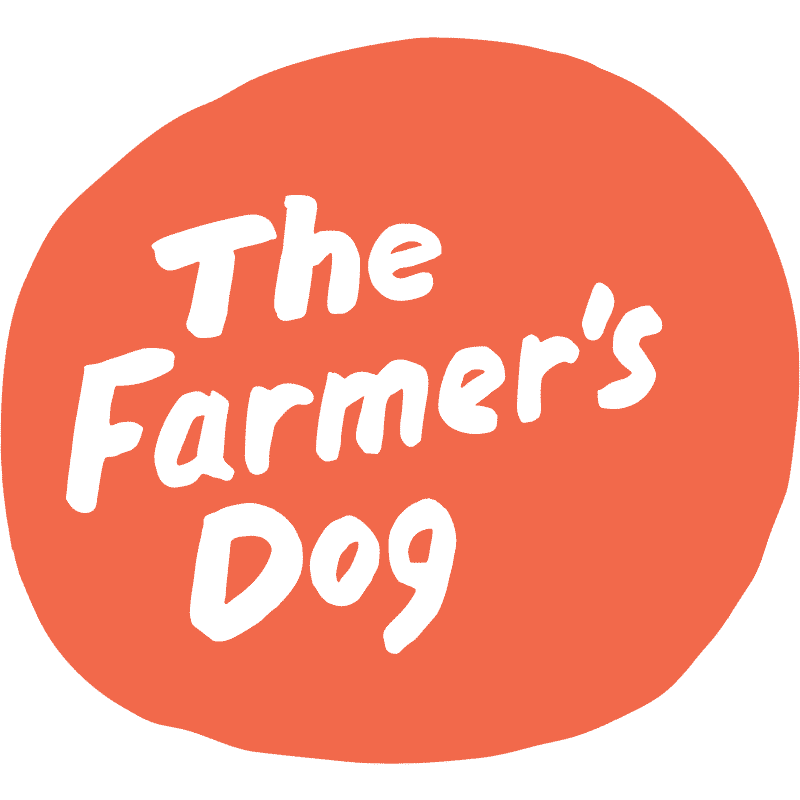The Dog Tale is reader-supported. We may earn a commission if you buy something through our site; this doesn’t change our recommendations.
Feeding your Yorkie a nutrient-dense, well-balanced diet is one of the best things you can do for your pet. Whether you want to choose the best packaged food, whip up a healthy homemade meal, or just give your pup a tasty treat, it’s important to understand your dog’s nutritional needs and what foods are safe for Yorkies.
This guide will cover the fundamentals of a healthy Yorkie diet and discuss what human food is good for Yorkies.
Want high-quality dog food recommendations? Check out our guide to the best dog food for Yorkies.
In this guide:
- An illustrated guide to Yorkie foods
- What do Yorkies eat?
- Yorkie foods to avoid
- FAQs: “Can my Yorkie eat X?”
An illustrated guide to Yorkie foods

- Fresh, human-grade dog food
- Automatic shipping, so you never have too much or too little; cancel any time
- Get 50% off your first delivery
What do Yorkies eat?
A Yorkie’s diet should consist of three important types of food: protein, carbohydrates, and fat.2 All three are important and there needs to be a balance among them in the correct proportion.4
Lower on this page we’ll talk about specific types of foods you can feed your Yorkie. But first, let’s cover the basics of a healthy diet.
>> Read more: Best Dog Food for IBD & IBS
The fundamentals of a healthy Yorkie diet
Protein
Protein is a building block for muscle. It is essential for growth and development in puppies and physical maintenance in adults. Dogs can use the amino acids from both plant and animal proteins, but animal proteins contain a more appropriate combination of amino acids, which makes animal proteins more desirable in dog food.1
Approximately 30% to 60% of a dog’s regular diet should be crude protein (60% for a growing puppy, approximately 40% to 50% for smaller breeds, and as little as 30% for larger breeds).2 These proteins should come from common meats, such as beef and chicken, but they can also come from protein-rich plant sources.2
>> Read more: What’s the Difference Between Puppy and Adult Dog Food?
Carbohydrates
In addition to high-quality protein content, the nutritionists at Tufts University advise that dogs also need carbs for a well-balanced diet, although an exact amount hasn’t yet been established.1
Dogs can handle moderate levels of carbs just fine.1 In fact, the Tufts nutritionists state that by adding carbohydrates to a dog’s diet, we can add important compounds, like fiber, without creating a diet too high in calories or fat.
In his book, Dr. Pitcairn suggests that while dogs are designed to eat meat, nearly half of their diet should contain mostly carbohydrates (grains or starchy veggies) complemented with some greens, fruits, and healthy fats.2
>> Read more: Best Soft Dog Food for Senior Dogs
Fats, vitamins & minerals
Fat is made up of small units called fatty acids. These are necessary for good health and body function. Fat can be found in a variety of foods like meat, nuts, seeds, grains, and vegetables. Fat contains twice the calories of protein and carbohydrates, and it is the way the body stores energy. While some fat is crucial, too much fat in a Yorkie’s diet can cause serious health problems, like pancreatitis.1
While vitamins do not provide any calories, they are essential to the maintenance of normal body function. On the cellular level, vitamins help break down protein, fat, and carbohydrates.
Generally, only small amounts of vitamins are needed, but if necessary levels are not met, the result can lead to serious health issues, if not death.1 Some of these necessary vitamins are: thiamine (B1), riboflavin (B2), niacin, B12, choline, and Vitamins A, D, and E.1
Minerals are also essential for proper body function. They largely make up bone and red blood cells. They are also important for the contraction of muscles, including the heart. Some necessary minerals include calcium, phosphorus, potassium, sodium, iron, zinc, and magnesium, as well as some lesser-known ones.1 These important minerals can be found in foods such as meat, fish, nuts, grains, legumes, fruit, and vegetables.
>> Read more: How Much to Feed a Yorkie: Printable Feeding Schedule
- Protect your pet in seconds
- Accident & Illness + Optional Wellness coverage available
- Policies start at just $9.99/mo
What human food is good for Yorkies?
Whether you’re feeding your Yorkie a completely homemade diet or you just can’t resist slipping them some table scraps, this ingredients list is safe.
Meats & protein-rich plants
Protein is one of the three components to a healthy dog’s diet: protein, fat, and carbohydrates. You can have two types of sources for protein: meat and plants. Both are beneficial, but animal protein may have an advantage over plant-based protein due to a more appropriate combination of amino acids.
Better yet, a combination of both meat and plant protein may be used “to overcome limitations that the proteins may have independently,” according to Dr. Cailin Heinz, VMD.4
Tufts University nutritionists suggest sticking with common meats and animal products, such as chicken, eggs, turkey, and beef and avoiding less-researched meats like bison, kangaroo, and wild boar.3 These exotic meats are less common and their lack of availability may affect their quality and price tag. Dr. Pitcairn suggests limiting the meat to lean cuts only.2
Common meats and animal products
- Lean Beef: Iron, zinc, selenium, and vitamins B12, B3 and B6; aids in blood cell and nerve health
- Chicken: Omega-6, zinc, and glucosamine; supports healthy joints, bones, and skin
- Fish: Omega 3 fatty acids, which aid in reducing inflammation; found in cold water ocean fish, such as Mackerel, Sardines, Anchovies, Menhaden, Herring, and Salmon
- Eggs: Omega-6, Vitamin A and B12, folate, iron, selenium, and riboflavin; supports healthy coat and strong bones and teeth
- Turkey: Omega-6; supports the immune system, blood health, and cell regeneration
- Pork: Biotin (B7); supports healthy digestion and healthy hormone production; use sparingly and avoid fatty cuts like bacon and ham.
>> Read more: Home Remedy for Dog Joint Pain
High-protein plant sources
- Pea protein: Manganese, folate, copper, phosphorus, vitamins B6 and B2, niacin, and molybdenum; a complete protein that contains significantly more protein per calorie than beef, depending on the cut; supports blood and bone health
- Soy: Vitamin C, folate, calcium, iron, magnesium, phosphorus, potassium, thiamin; a complete protein; supports bone and blood vessel health; organic is recommended
- Lentils: B vitamins, iron, magnesium, potassium, zinc, and fiber; supports blood and cardiovascular health
- Peas: Fiber, thiamine, folate, manganese, and vitamins A, C, and K; supports digestion and regulates blood sugar levels
- Beans: (Ex: black, kidney, pinto, and garbanzo) Fiber, B vitamins; supports blood sugar levels and cell metabolism
- Whole grains: Fiber, B vitamins, antioxidants, iron, zinc, copper, and magnesium; supports immune system and metabolism
- Starchy vegetables: (Ex: potatoes, squash, and pumpkin) Fiber, potassium, vitamin A and C, folate and magnesium; stabilizes blood sugar levels, supports red blood cell formation, cell growth, and function
Vegetables
Vegetables pack a lot of nutrition without many calories. Not only can they provide your Yorkie with necessary dietary fiber, but they also provide essential vitamins and minerals required for a well-balanced diet. B vitamins and fiber can help combat health issues like poor digestion and pancreatitis.
About 10% to 20% of your Yorkie’s diet should consist of low-carb vegetables and fruits (less for puppies, more for older dogs). Larger dogs could have up to 30% of their diet in the form of vegetables and fruit.
>> Read more: What Vegetables Can Dogs Eat? Safe & Healthy Ingredient List
Common vegetables
- Broccoli: Good source of Vitamin C & K, fiber, and calcium
- Carrots: Provides fiber, beta carotene, vitamin K1, potassium, and antioxidants
- Sweet potatoes: Good source of iron, calcium, selenium, many B vitamins, and vitamin C
- Mushrooms: Good source of B vitamins and fiber
- Zucchini: Contains antioxidants and phytonutrients, including vitamin C, beta-carotene, manganese
- Peas: Good source of protein, fiber, vitamin C & K and folate
- Green beans: Provides vitamin K, folate, and silicon
>> Read more: What Are Good Treats for Yorkies?
Grains
In recent years, grain-free dog food recipes have become a potential solution for dogs with sensitive stomachs. However, this has caused other dog owners to jump onto the grain-free recipe bandwagon regardless of their dogs’ digestive systems.
Many veterinary nutritionists warn against believing the myth that grains are necessarily bad for your dog. The contrary is true; grains can provide essential vitamins, minerals, and fiber your dog needs to maintain appropriate body function.2 In fact, in July 2018, the FDA released a warning about the correlation between grain-free dog food and a serious heart condition called dilated cardiomyopathy.5
Don’t let this warning scare you into giving your Yorkie too much grain—as usual, moderation is key. If you provide too much grain, your Yorkie may miss out on essential protein, fat, fruits, or veggies in their calories.
So, a combination of grains and starchy vegetables should count for approximately 30% to 60% of the calories your dog consumes (higher levels for adult dogs, lower levels for puppies).2
According to Dr. Pitcairn, incorporating grains into your Yorkie’s diet can be beneficial to their health. Not only can grains sustain energy levels, but they also support healthy skin, coats, immune systems, and metabolism. Grains are rich in fiber, B vitamins, antioxidants, iron, phosphorus, zinc, copper, and magnesium. However, you should avoid white rice and white flour.
Common grains Yorkies can eat
- Oats
- Brown rice
- Wheat
- Quinoa
- Whole grain pasta
- Barley
- Millet
- Buckwheat
>> Read more: Best Wet Dog Food for Senior Dogs
Other common foods
Here are some other healthy foods for Yorkies:
- Seeds: Hemp hearts, ground flaxseeds, chia, and sunflower
- Yogurt & cheese (in moderation): use sparingly and avoid if there are digestive issues. Many dogs do not tolerate dairy in large portions.
- Nut butters: peanut, almond, cashew, sunflower, and sesame. Do not feed Yorkies walnuts nor macadamia nuts, and do not feed them any nuts in excess.
What fruits can Yorkies eat?
Yorkies can eat:
- Berries
- Apples
- Bananas
- Melons
- Stone fruits with pits removed
- Papayas
- Pineapple (Tip: Papayas and pineapples help with bloating, gas, and indigestion2)
Fruits to avoid:
- Grapes and raisins – never
- Citrus unless used sparingly
- Coconut (flesh and milk); small amounts are unlikely to be problematic
Fruits are perfect for a snack or to add to your Yorkie’s food. They are filled with many essential nutrients that Yorkie foods sometimes lack, including antioxidants, potassium, magnesium, fiber, vitamin C, and folate. And they can help fight disease and inflammation. However, a Yorkshire Terrier’s diet should only consist of 10% to 20% low-carb veggies and fruits.
>> Read more: IBD & IBS in Dogs
Want healthy Yorkie food without the hassle?
Feeding your Yorkie real, high-quality ingredients is one of the best ways to improve or prevent health issues and to help them live a long life. But sometimes it’s hard enough to put a home-cooked meal on your own table, much less in a dog bowl.
If you’d rather have premium, human-grade meals delivered to your door, check out our The Farmer’s Dog, Ollie Dog Food, and Nom Nom Dog Food reviews. These dog food subscription companies use many of the whole, natural ingredients mentioned above. Plus, each meal is carefully calibrated specifically for your dog’s breed, age, and tiny size, so you can feel good about the nutrition they’re receiving without the hassle of preparing nutrient-appropriate meals.
>> Read more: Nom Nom vs Ollie: Which Dog Food Delivery Service Is Best?
Yorkie foods to avoid
Preparing homemade food for Yorkies is an excellent way to strip out the artificial flavors, additives, and preservatives that many commercial dry dog food brands add to dilute their products or to make it shelf-stable. However, it also exposes you to the risk of feeding your pup food that is bad for Yorkies. So before you get started, review this list of foods to avoid.2
- Grapes and raisins: Include an unknown substance that can cause kidney failure
- Citrus and coconut (milk and flesh) in excess: Coconut can cause digestive issues like diarrhea
- Chocolate: can cause vomiting, diarrhea, panting, tremors, seizures, or possible death
- Food additives or chemical preservatives: can cause damage to liver and kidneys, cancer, hypersensitivity, allergies, and behavior issues resulting from food dyes
- Coffee and Tea (in excess): Restlessness, rapid breathing and heart rate, tremors, bleeding, possible death
- Dairy products: Can trigger food allergies or cause GI issues
- Alcohol: Vomiting, diarrhea, breathing difficulties, tremors, coma, central nervous system depression
- Hot, spicy foods: The capsicum in spicy food like jalapenos can cause indigestion or diarrhea
- Onions or Garlic: GI irritation and red blood cell damage; Garlic in small amounts is not a concern
- Nuts (in excess): No macadamias and walnuts; vomiting, diarrhea, tremors, rapid heart rate
- Raw or undercooked meat: Meat can be fed raw, but it comes with an increased risk of food poisoning or parasites, so you need to be cautious about contamination. Meal plans like We Feed Raw Dog Food make this easier.
- Raw eggs: Avidin in raw egg whites can decrease biotin absorption and trigger skin and coat problems
- Mold and spoilage: Vomiting or diarrhea. Be sure to seal bags of kibble and use before their expiration date
- Salty foods: Excess thirst and urination. Vomiting, diarrhea, depression, tremors, seizures, elevated body temperature
- Small raw bones: Poultry or fish bones may splinter, causing choking or punctures
- Sugary snacks: Obesity, dental problems, diabetes
- Xylitol: possible liver failure or seizures, vomiting, lethargy, or loss of coordination
- Yeasted dough (raw): painful stomach bloat, possible life-threatening gastric torsion
>> Read more: My Dog Has Loose Stools and Smelly Gas
- Protect your pet in seconds
- Accident & Illness + Optional Wellness coverage available
- Policies start at just $9.99/mo
FAQs: “Can my Yorkie eat X?”
Can Yorkies eat eggs?
Yes. Yorkies can have eggs, but they do need to be cooked to prevent avidin in the egg white decreasing biotin absorption.
Can Yorkies drink milk?
Yes, but only in small amounts. Yorkies can have milk and other dairy products if carefully supervised, but it’s not the best for them. Some dogs may lack the enzyme necessary to digest milk properly, causing GI problems.
Can Yorkies eat peanut butter?
Yes. Yorkies can have peanut butter, but not in excess. Too much can cause vomiting or diarrhea. It’s best to feed them natural peanut butter that does not have additives, like sugar, which can throw off the blood-sugar levels of small dogs like Yorkies.
Can Yorkies eat pineapple?
Yes, Yorkies can have pineapple. It can help with bloating, gas, and sensitive digestion. But, as with most things, moderation is key.
Can Yorkies eat carrots?
Yes. Carrots make great snacks for Yorkies and seem to be one of the things Yorkies love. Plus their crunchy texture can help clean your Yorkie’s teeth. Just be sure to cut them into small pieces your dog can chew. Thin baby carrots are perfect.
Can Yorkies eat mango?
Yes. Mango is a healthy snack for Yorkies. The pit needs to be removed from all stone fruits first.
Can Yorkies eat chocolate?
No. Chocolate, especially dark chocolate, can cause vomiting, diarrhea, panting, excess thirst and urination, hyperactivity, abnormal heartbeat, tremors, seizures, or even possible death. What about chocolate-flavored hazelnut spreads? For example, can dogs eat Nutella? Still no, since these products contain cocoa.
Can Yorkies eat blueberries?
Yes, blueberries, and other summer berries, are a great addition to Yorkshire Terrier foods.
Can Yorkies eat tomatoes?
It depends on who you talk to. While some pet nutritionists say tomatoes are a go, others say that you should limit them or, at least, make sure they are fully ripe before adding them to your Yorkie’s food.
Do you know what to feed a Yorkie?
As a pet owner, it’s important to be knowledgeable about the foods Yorkies can eat as well as which foods to avoid. Getting the appropriate amount of protein, fat, vitamins, and minerals in those foods is key to a long, happy, and healthy Yorkie life.
>> Read more: Yorkshire Terriers: Everything You Need to Know About the Yorkie Dog Breed
The Farmer’s Dog vs Ollie: Which Dog Food Subscription Is Best?
References
- Tufts University Clinical Nutrition Team. Pet Nutrition Primer
- Pitcairn, R. H., & Pitcairn, S. H. (2017). Dr. Pitcairn’s complete guide to natural health for dogs & cats. Emmaus, PA: Rodale.
- Tufts University Clinical Nutrition Team. Alligator, Wild Boar, Ostrich – Oh My!
- Heinze, C. Pondering Pet Protein: How much protein should my pet get?
- FDA.gov. FDA Investigation into Potential Link between Certain Diets and Canine Dilated Cardiomyopathy



